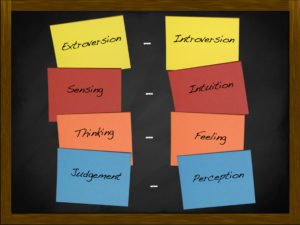Myers Briggs Type Indicator (MBTI)
 The MBTI assessment was developed by Isabel Myers and Katharine Briggs as an application of Carl Jung’s theory of personality types. This theory suggests that we have opposite ways of:
The MBTI assessment was developed by Isabel Myers and Katharine Briggs as an application of Carl Jung’s theory of personality types. This theory suggests that we have opposite ways of:
- directing and receiving energy (Extraversion or Introversion);
- taking in information (Sensing or Intuition);
- deciding or coming to conclusions about that information (Thinking or Feeling); and
- approaching the outside world (Judging or Perceiving).
Individuals complete a self-assessment and receive a “type” profile. This information helps to increase an individual’s awareness of how their preferences, strengths and blind spots impact how they manage themselves and their relations with others.
The MBTI and its benefits around communication and teaming
One of the greatest benefits that comes with understanding personality type (MBTI) is an improved ability to differentiate between intentional and misunderstood messages.
Some other benefits include:
- First step to change is “self-awareness”
- Fosters openness and trust
- Provides a neutral and affirmative language with which to discuss differences
- Underscores the value of diversity and advantages to work with the strengths of others
- Identifying team assets and blind spots
- Powerful tool for building relationships
- Take the learnings with you anywhere you go – in and outside of work



